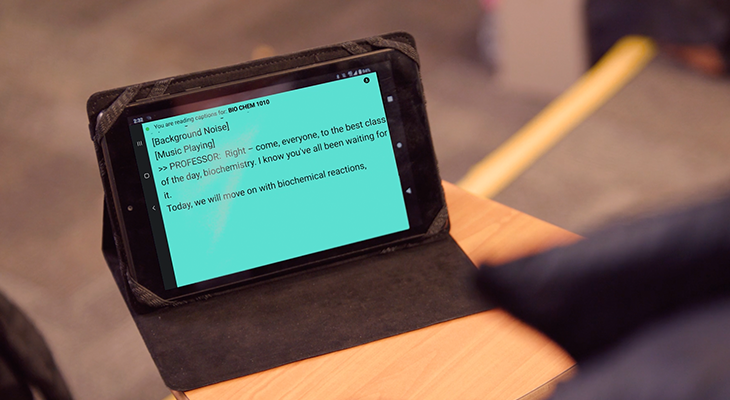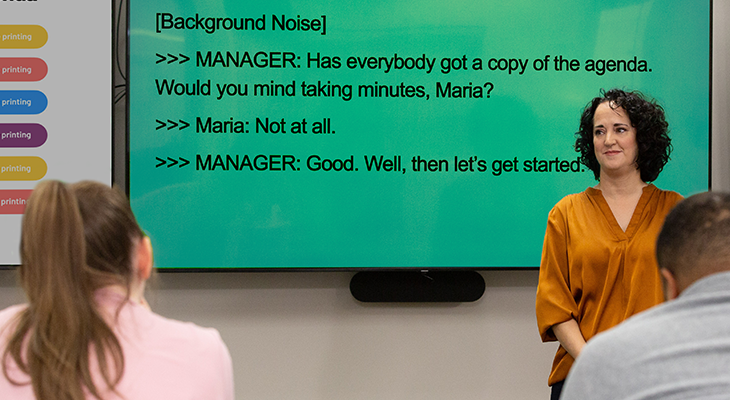Transcription Services
Sorenson is your single-source provider for closed captioning, subtitling, live captioning, and transcription services.
Efficient captioning and transcription services
Depending on the circumstance, you may need live captioning, closed captions, subtitles, transcription, or a combination of these services. Sorenson provides each of these and more, so you won’t need to juggle multiple service providers.
Closed captioning and subtitling your content improves accessibility for Deaf and hard-of-hearing audience members as well as non-native language users. Research also shows media captions improve engagement, comprehension, and retention across user demographics.
Transcripts not only make audio content more accessible, but they are also excellent for documentation and record-keeping. Even the most diligent note-taking can’t beat transcription for comprehensiveness and accuracy.
Post-Production Transcription Benefits and Options
Closed Captions or Open Captions
Sorenson’s has both closed captions (that you can turn on or off) and open captions (burned onto your media) post-production captioning services.
When you choose one of these solutions, we provide captioning for speech and unspoken audio on your video or other media in the same language.

Reading clear, accurate text of a presentation increases understanding.
Make foreign language media accessible and support bilingual audience inclusion.
Studies find it’s easier to grasp information you can read as well as hear.
Converting audio to text offers full and accurate documentation for your records.
Subtitle Services
Our subtitling service adds captions of speech in another language than the original audio. You may order subtitles that you can enable/disable or permanently embedded on the media.
Reading clear, accurate text of a presentation increases understanding.
Make foreign language media accessible and support bilingual audience inclusion.
Studies find it’s easier to grasp information you can read as well as hear.
Converting audio to text offers full and accurate documentation for your records.
Transcription Services
We can transcribe the full audio from any form of media into a text document to share with your audience or to keep for your records, including or excluding text of non-verbal audio and filler words.
Reading clear, accurate text of a presentation increases understanding.
Make foreign language media accessible and support bilingual audience inclusion.
Studies find it’s easier to grasp information you can read as well as hear.
Converting audio to text offers full and accurate documentation for your records.
Sorenson Scoops

Better performance
A 2016 USFSP study documented a 7.2% higher grade average among students with captioning services than those without access to captions in the same class.

Remember more with captions
Captioning improves immediate recall and long-term memory of content and reduces the impact of background noise, per a 2021 study published in “Ear and Hearing,” the official journal of the American Auditory Society

Follow the leader
We have been so impressed with the captioning services as well as the collaboration to make our classrooms and live events accessible.” — Southern Oregon University
Frequently Asked Questions
If you have questions we don’t cover here or on our support page, our team is happy to fill in the blanks.
You’ve probably heard of at least two types of captions, often interchanged although they’re not the same: closed captions vs subtitles. What’s the difference?
- Closed captions are a text version of all audio on a piece of media: spoken and unspoken. They encompass the speech and the *noise*—music, laughter, applause, barking dogs, and honking horns. You have the option to enable or disable closed captions on screen.
- Open captions include the same content as closed captions, but you can’t turn them off; they’re a permanent addition to the media.
- Subtitles include speech only—not unspoken audio—and they’re typically a tool for displaying content in another language.
- BONUS: Subtitles for the Deaf and hard-of-hearing (SDH). This type combines closed captions and subtitles to present both spoken and unspoken audio in text in another language than the audio.
In short, closed captions include all audio while subtitles are only speech. For a more detailed answer, refer to the question above to review the types of captions.
Open captions are burnt onto media, so you can’t turn them off like closed captions or subtitles.
Learn more about our captioning services?
Complete the form and we’ll answer any questions or set you up with service.

